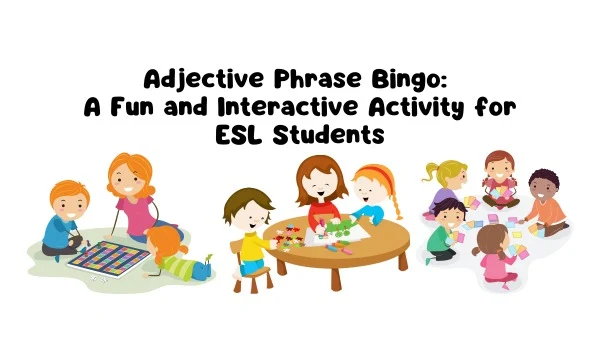Adjective Phrase Bingo: A Fun and Interactive Activity for ESL Students
Looking for an exciting way to help your students master adjective phrases while keeping them engaged? Adjective Phrase Bingo is a simple yet highly effective activity that brings grammar to life in the classroom. By turning learning into a game, this activity not only boosts understanding but also encourages students to actively participate and enjoy the process.
Whether you're an ESL teacher looking for fresh, interactive ways to teach grammar or a student hoping to strengthen your understanding of adjective phrases, this activity is perfect for you. It’s also a great resource for tutors, language coaches, and even parents looking to support learners outside the classroom.
Let’s dive into how Adjective Phrase Bingo can transform your grammar lessons into a fun, competitive learning experience for everyone!
Introduction
This is an activity for teaching and practicing adjective phrases in a fun and interactive way.
What is an adjective phrase?
Adjective phrases are groups of words, headed by an adjective, that describe a noun or a pronoun.
Example
Many of these books include short stories for young readers. [Of these books modifies the pronoun Many, telling which ones. For young readers modifies the noun short stories, telling what kind.]
Title:
Adjective Phrase Bingo (Download here.)
Objectives
- Identify adjective phrases in sentences
- Use adjective phrases to modify nouns and pronouns
Materials
- A set of bingo cards with sentences containing adjective phrases (one per student)
- A list of adjective phrases from the bingo cards (for the teacher)
- Markers or chips to cover the bingo squares
Procedure
- Explain to the students what an adjective phrase is and give some examples.
- Tell the students that they are going to play bingo with sentences containing adjective phrases. Distribute the bingo cards and markers or chips to the students.
- Explain the rules of the game:
The teacher will read out an adjective phrase from the list.
The students will look for a sentence on their bingo card that contains that adjective phrase.
If they find one, they will cover that square with a marker or chip.
The first student to cover five squares in a row, column, or diagonal will shout “Bingo!” and read out their sentences.
The teacher will check their answers and declare them the winner if they are correct. - Start the game by reading out an adjective phrase from the list. Repeat until someone gets a bingo or until all the adjective phrases have been read out.
- Review the sentences with the students and ask them to identify the head adjective and its dependents in each adjective phrase. Also, ask them to classify each adjective phrase as attributive (before the noun) or predicative (after the noun).
Assessment
- Ask them to write their own sentences using adjective phrases
- Give them a worksheet with sentences containing adjective phrases and ask them to underline them
- Give them a quiz with multiple-choice questions on identifying and using adjective phrases
Extension
- Ask the students to create their own bingo cards with sentences containing adjective phrases
- Vary the difficulty of the sentences and adjective phrases according to the level of the students
- Introduce other types of phrases, such as adverb phrases or noun phrases, and play bingo with them
Variations
- Play bingo with single-word adjectives instead of adjective phrases
- Play bingo with different types of adjectives, such as comparative, superlative, or possessive adjectives
- Play bingo with different themes or topics for the sentences, such as hobbies, animals, or food
Reflection
- What did you learn about adjective phrases today?
- How do you use adjective phrases in your writing and speaking?
- What difficulties did you face while playing bingo with adjective phrases?
- How can you improve your use of adjective phrases?
Notes
- Make sure that each bingo card has a different arrangement of sentences and that each sentence contains only one adjective phrase.
- Prepare enough bingo cards for each student or pair of students.
- You can use online tools to generate bingo cards and lists of adjective phrases.


